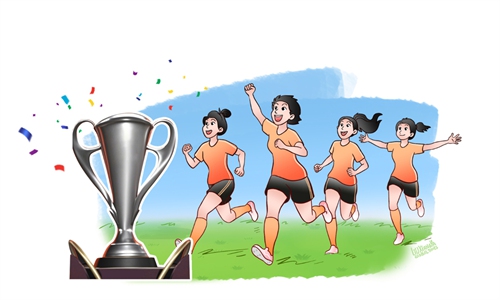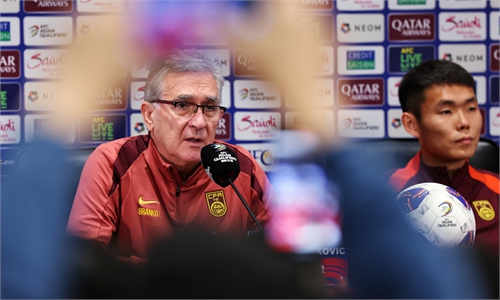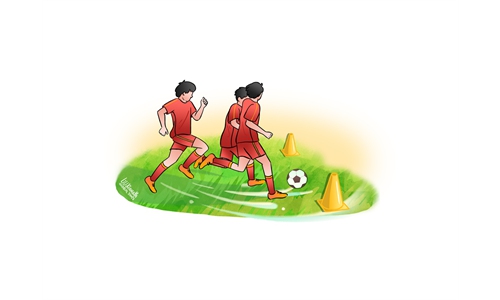SPORT / FOOTBALL
Chinese U16 national team sparks optimism with impressive performances
Rising hopes
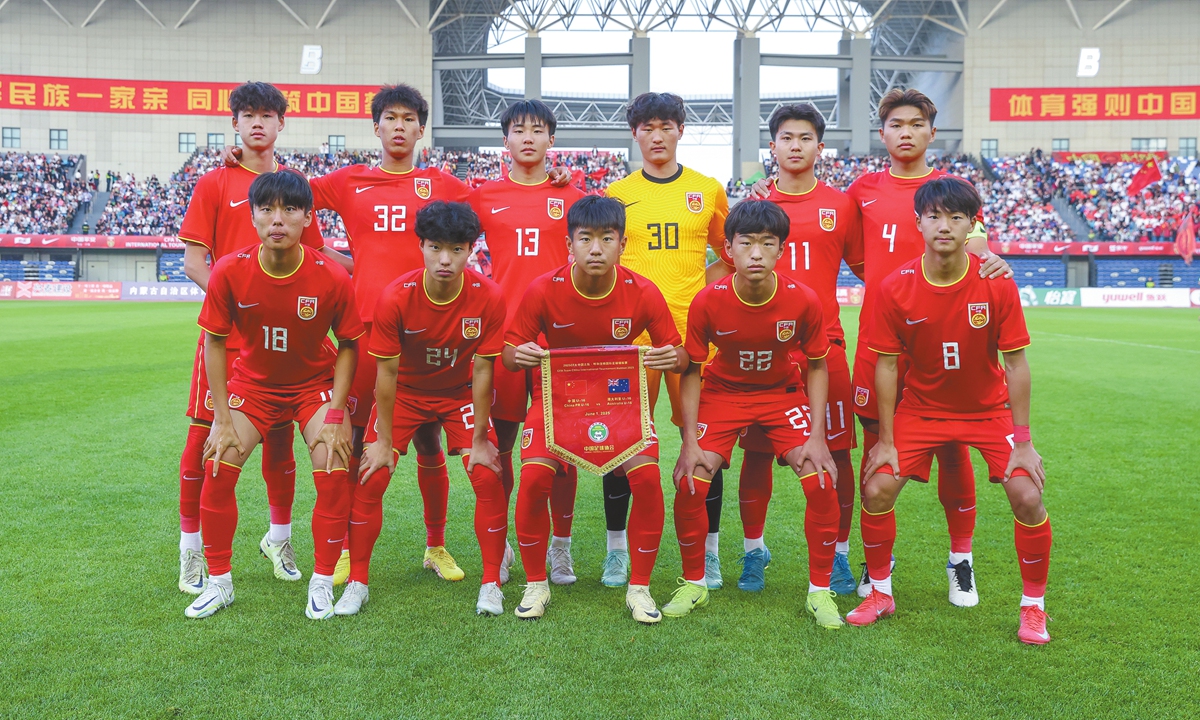
China's U16 national men's football team defeats Australia 5-2 to win the championship at the U16 International Tournament in Hohhot, North China's Inner Mongolia Autonomous Region on June 1, 2025. Photo: VCG
The Chinese national under-16 football team's win at a home invitational event has sparked fresh conversations on the future prospect of Chinese football.
On Sunday, the team defeated their Australian counterpart 5-2 to clinch the four-team invitational title in Hohhot, North China's Inner Mongolia Autonomous Region, with an unbeaten record. The Chinese team had earlier beaten Saudi Arabia 2-1 and drew 2-2 with Vietnam.
Attendance figures highlighted the tournament's popularity: Nearly 12,000 fans attended the opener against Saudi Arabia, while heavy rain reduced turnout to 9,234 for the match against Vietnam. The final against Australia drew 17,511 spectators. Such attendance rates are even higher than those of many domestic league matches.
Many fans pinned their hopes on offense players such as Shuai Weihao, who shone as a substitute in the previous round and still scored highly as a starter in the final match, and Xie Jin, who delivers brilliant performances on the wing every time he comes off the bench.
Before the invitational, the Chinese U16 team also set a team-best record at the Montaigu Tournament in France in April with a fourth-place finish in an eight-team event that featured their counterparts from France, Cameroon, Portugal, Mexico, Japan, and England.
The Chinese U16 team's focus will now shift onto the qualification for the Under-17 Asian Cup in 2026 in Saudi Arabia, where a top-eight finish in the Asian Cup will see the Chinese team qualify for the FIFA Under-17 World Cup for the first time in over two decades.
Global exposure
Led by head coach Bin Ukishima, the win in Hohhot is the Chinese U16 team's first public appearance domestically, noted Ma Dexing, a seasoned football commemorator.
"The three visiting teams participating in this Hohhot tournament are of a high standard, ensuring the high quality of the event," Ma wrote in his commentary. "It allows us to gain a clearer understanding of our positioning within Asia."
Ma believes that the team's international experience is vital for the players to build match confidence.
Before the Montaigu Cup, the U16 team had two matches in Germany against U16 teams, namely Bundesliga clubs VfL Wolfsburg and Borussia Mönchengladbach, during which the Chinese U16 team won 3-1 and 1-0 respectively.
"Participating in the Montaigu Cup helped boost the players' confidence as other participating teams in the events are higher, as they come from Europe, Africa, and the Americas," Ma said, noting that the Chinese team should find its position in Asia first.
"A more realistic positioning for the national youth team is between 9th and 16th in Asia, with a short-term goal to strive to enter the top eight in Asia," Ma noted. "Therefore, only by competing and warming up against all kinds of strong Asian teams can we have a clearer understanding of our positioning."
Chen Yong, a football commemorator with Soccer News newspaper, told the Global Times that the team's confidence building is vital for the team to deliver solid performances.
"Behind the team's spirited performances, what touches people most is their confidence when facing Asian powerhouses and their undisguised desire for victory," Chen said.
"Of course, the 2009-born national youth team is not without flaws, but the entire team's hunger for victory and the confidence displayed by most players in matches are particularly valuable."
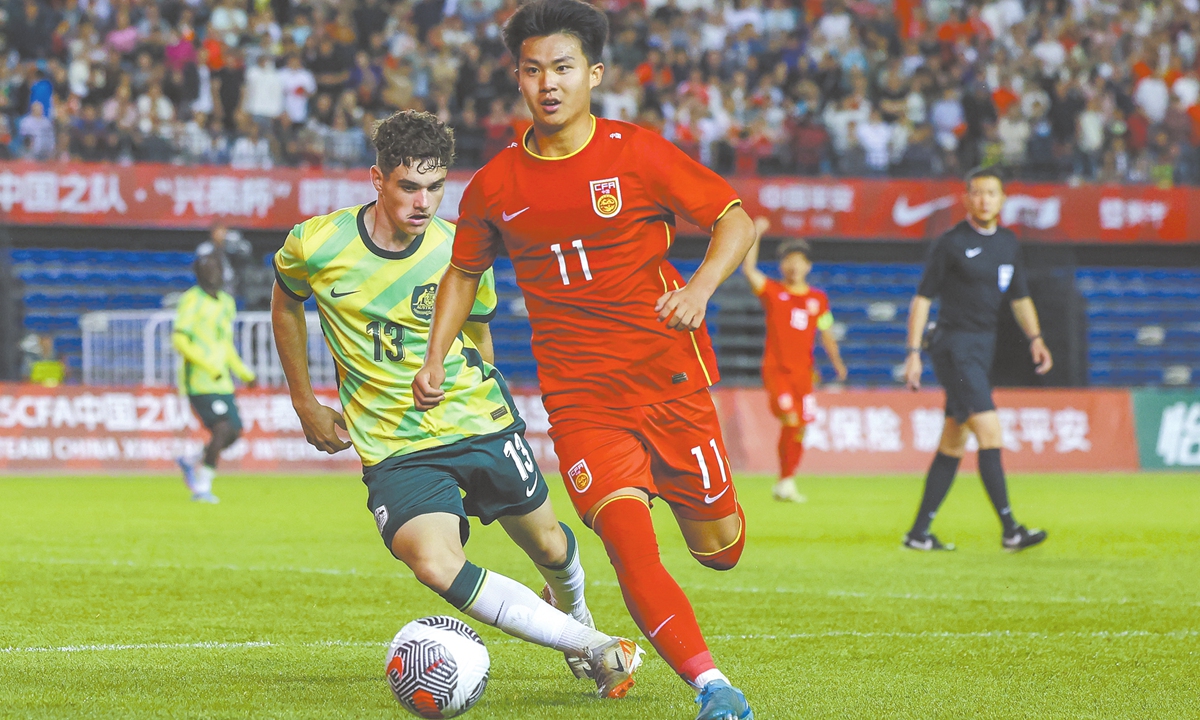
Chinese striker Liang Shiyu dribbles the ball during the match between China and Australia on June 1. Photo: VCG
Confidence matters
Chen insisted that hosting friendlies is essential to building the team's match confidence.
"This kind of self-confidence is precisely what the senior national team lacks. Although the senior national team has made great efforts and shown their fighting spirit in recent matches, it clearly lacks confidence in many games, especially against strong opponents," Chen said.
"Negative psychological suggestions naturally greatly reduce players' actual combat effectiveness, leading to a vicious cycle. Match confidence relies on every real match experience and the gradual accumulation of each victory — this is the value of what many people dismiss as 'friendly matches.'"
The Chinese Football Association has introduced several efforts to revamp its youth football structure in recent years, including implementing a unified national calendar for youth competitions and enhancing coaching quality. These reforms aim to provide consistent, high-quality development opportunities for young players.
Zhang Bin, a Beijing-based sports commentator, noted that it is too early to say that these players could carry the flag for the national team as he warned that players might face much more complicated situations in their transition to being full-time professional footballers.
"Tactically these players have delivered quality performance that surprised many fans who are used to the inconsistency of the senior national team's players," Zhang told the Global Times.
"With a position in the domestic leagues, ideally they will get more competitive in the future, and help the young Chinese players to grow, but it takes a lot of joint efforts to pace up the leagues."
